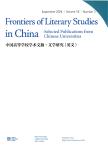The Machiavellian, the Philistine, the Romantic: Rereading Human, Ah, Human!
The Machiavellian, the Philistine, the Romantic: Rereading Human, Ah, Human!作者机构:Department of East Asian Studies New York University New York NY 10003 USA
出 版 物:《Frontiers of Literary Studies in China-Selected Publications from Chinese Universities》 (中国高等学校学术文摘·文学研究(英文版))
年 卷 期:2016年第10卷第4期
页 面:561-597页
学科分类:030504[法学-国外马克思主义研究] 01[哲学] 03[法学] 030501[法学-马克思主义基本原理] 0101[哲学-哲学] 010108[哲学-科学技术哲学] 0305[法学-马克思主义理论]
基 金:Acknowledgements This study is supported by Social Science Foundation 2015 (15ZDB023) "Major Issues in Contemporary Aesthetics and Criticism" ("Dangdai meixue de jiben wenti ji piping xingtai yanjiu" 当代美学的基本问题及批评形态研究). I also benefited a great deal from the suggestions debates and criticisms of the panelists of the 2014 ACLA Panel "Reimagining Capital in Postsocialism."
主 题:Dai Houying Cultural Revolution revisiting the 198os humanism individual
摘 要:Within the few years of its first publication in 1980' Dai Houying's most popular and controversial novel Human, Ah, Human! drew significant attention from literary scholars throughout Chinese and English world and was often interpreted by the liberal humanist discourse as the representative work of the "thaw literature" or as the plea to revive the "human." Recently, such appropriations of the notions of "the human" have raised suspicions among some critics both from the Beijing-based "revisiting the 1980s (重返八十年代) group" and some Western critical scholars, who begin to reevaluate Marxist humanism in the 1980s China. This paper, however, attempts to utilize several post-humanist critical theories that have been persistently on guard against the theoretical limits of both liberal and Marxist humanism to reinterpret this novel. Here, the novel Human, Ah! Human, is able to encompass both the contradiction and reconciliation of various kinds of "human" voices. This paper will revisit its theatrical setting where the newborn "human" figures encounter and contend with one another. Rather than the sudden emergence of a humanist hero, or a Marxist humanist hero, it is the encounter of the Machiavellian wild individual, the philistines who pursue earthly happiness, and the romantics, that offer the untrodden path to approach the historical "real." This paper will exhibit their combinations, permutation, and rehearsal in the fictional structure.



